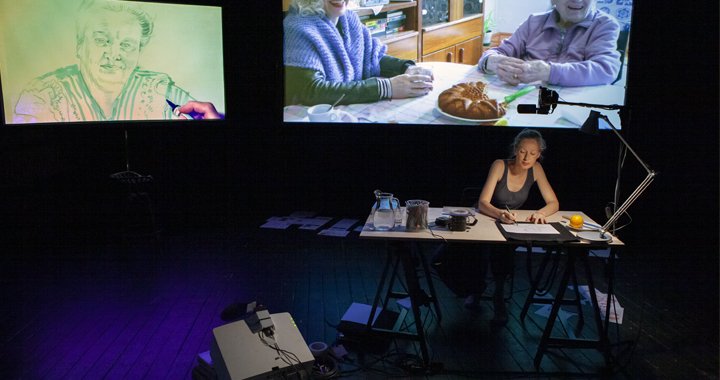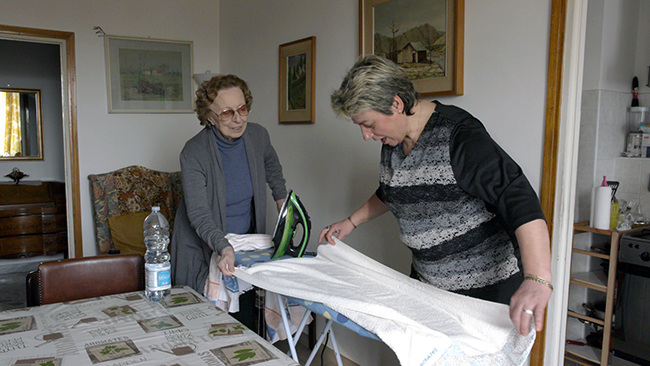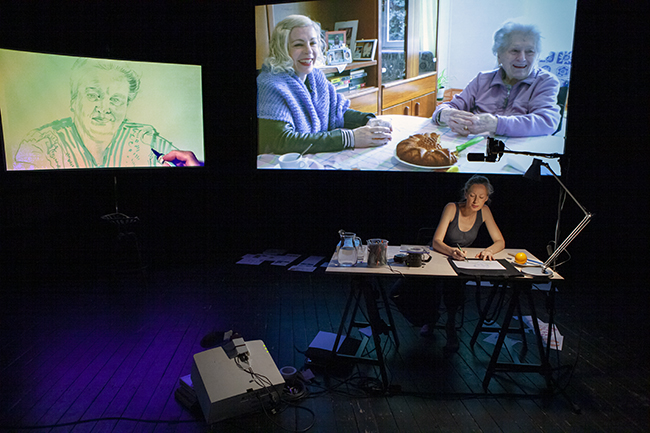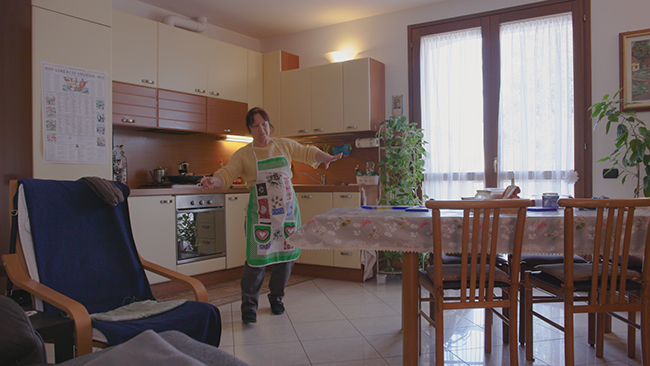
All you need is love
Interview with Estonian artist and maker of documentary films and performances, Kristina Norman
14/10/2019
Kristina Norman is undoubtedly one of the most controversial and versatile Estonian artists of the 21st century. Her practice lies in between performance, documentary filmmaking and, may I say, the beauty of art in general. Her interest in social and political processes and the urge of researching collective thinking and common issues of everyday life through a very personal and poetic point of view has made her one of the most interesting and internationally acclaimed artists of the region. In 2009 she represented Estonia at the Venice Biennale with a ground-breaking documentary “After-War” – a multilayered installation comprising videos and scuptures and includes a video documantation of a happening in which Norman brought a golden replica of the so-called Bronze Soldier (“Monument to the Liberators of Tallinn” erected by Soviet authorities in 1947) to the Tõnismäe hillock in Tallinn two years after the Estonian government had the monument removed from this prominent location in the city center. The artist's action that took place on the significant date of 9 May opened up discussions about the way we overlook past events of our nations and how they affect us today.
Kristina Norman’s latest project – 90 min solo performance “Lighter than Woman” is yet another research on society within the fragile distinction between the imaginary Eastern and Western world. This docu-poetic work tells the story about women from the countries which emerged on the territory of the former Soviet Union and who have left behind their homes and families and have come to Italy to work as badantes – live-in personal care workers. Women of different ages, social statuses and backgrounds turn around their lives to become a pseudo part of an Italian family, taking care of the elderly in their homes. Norman claims that the most interesting part of doing this investigation is realising the psychological interstates these immigrant women experience in their work life in Italy.

Your documentary performance “Lighter than Woman” is defined as a documentary-poetic work, would you explain the meaning behind this characterization?
In “Lighter Than Woman” I treat the documenary material which I collected during the research in poetic way. This project is about emancipation and I see the poetic as a means to break free, to overcome the heaviness of real life. But overcoming reality doesn't mean fictionalizing it. On the contrary, the poetic is a political tool that serves to make sensible the silenced truth which is hidden within reality.
“Lighter Than Woman” is a rather intriguing title. What exactly stands behind the notion of lightness?
“Lighter Than Woman” looks into the phenomenon of badantes from multiple female perspectives – the immigrant care workers themselves, their Italian employers, myself as an artist, but also from the perspective of Samantha Cristoforetti – the first Italian woman in space (Cristoforetti spent 199 days on the International Space Station in 2014-2015).
At first glance, the connection between immigrant care workers and an astronaut might seem bizarre, but in fact they all have to deal with the effects of Gravity in their work on the daily basis. Badantes are immigrant women who bear the weight of caring for old Italian people, and Samantha Cristoforetti is an Italian woman who migrates into the physical condition of Zero-Gravity.
“Lighter Than Woman” is about Gravity and overcoming it. Gravity is literally the central force governing life on Earth, including the human body. But poetically, Gravity is also the heaviness of life itself. I look at the paradoxes of Gravity in both the physical and the metaphorical sense.
How is this metaphore and the parallel between badantes and the astronaut enacted in your piece?
What I find most fascinating is that badantes take on them the burden of other people. Sometimes they literally lift other people’s bodies, but they also enable their employers not to have to bear the weight of fully dedicating themselves to the care of their elderly or other family members who need care. In this sense, I find badantes as a phenomenon incredibly poetic.
A badante is a woman on a mission. Her mission is that of a rescue, of saving her family from poverty. She migrates to an alien country like an astronaut migrates to space, an alien environment for a human being. For the astronaut, reaching the state of physical weightlessness is the ultimate achievement, the goal of her entire life. A badante would experience weightlessness, too. She would leave her natural environment, her own home, her family, her career and would have to face the physically challenging labour in Italy. It would be unavoidable for her to experience the feeling of being suspended in-between, of belonging neither here nor there. After a decade or longer in Italy, she would feel simultaneously attached to and detached from the family and the home she had left behind. Her loved ones would have grown estranged from her because she would have missed the most important events of their lives. She would also have mixed feelings about belonging to her Italian home and family, because despite her affection, she is only a worker there and the relationship would only last as long as the elderly person is alive. So for a badante, the metaphorical condition of weightlessness comes as an unpleasant side-effect of the Gravity of migrant identity.

Kristina Norman, Lighter than Woman. Mayya and Rita ironing
So this work portrays women who have changed their lives and leaped into the unknown. How did you come across the phenomenon of badantes in the first place?
I was invited by the performing arts festival of Santarcangelo to make a new piece and the performance was born as a result of creative residencies in Santarcangelo di Romagna and Bologna in the region of Emilia Romagna in the North of Italy. I entered the theme of badantes through language. Because I usually decide to work in the documentary way, I find it crucial that I can communicate with my protagonists directly. As I didn't speak any Italian back then, I was searching for a topic and a community with whom I could speak Russian.
My attention was soon caught by the phenomenon of badantes. In the region of Emilia-Romagna this profession is mostly occupied by women from Ukraine, Moldova and Romania. “Una ucraina” (a Ukrainian) is often used as a synonym for “badante” there. Although in the whole of Italy there are about 2 million women working as badantes, they are almost invisible because they work six and a half days per week, 50 weeks a year and they spend most of their time in the four walls of private homes with the elderly. During my residency in Bologna and Santarcangelo, I mostly met and worked with women from the post-Soviet countries, the cultural environment which is familiar to me, where Russian was and still is spoken as a lingua franca among the people of my generation and older. So in the process of research for the project in Italy I learned some Italian but also Ukrainian and my knowledge of the Russian language was of great help in this.
And then I got carried away, reading some studies that show Italy being one of the most emancipated societies and I wanted to understand how badantes fit into this picture. So I developed this perception of the phenomenon of badantes as a byproduct of the emancipation of the Italian women, that in the Italian family the immigrant women fill-in the role formerly carried by the Italian women. This premise was the starting point of my work. And this is how Samantha Cristoforetti came to my mind as the radical image of an emancipated Italian woman, achieving the ultimate height in her work life. By the end of my research, the situation with badantes appeared much more complex to me, as I also explored the phenomenon from the point of view of the Italian women who employ them.
What is the political point you are aiming to make with your performance?
Many contemporary European societies are becoming more and more conservative and strongly oppose immigration. Major political forces in Italy stand strong on the traditional family model. Yet, according to statistics, there are more than 2 million Italian families that include an immigrant woman and in the families I've personally visited during my research, it's a woman from a former Socialist country who's taken on her the function of a keeper of Italian family traditions, starting from caring for the elderly and ending with cooking traditional Italian food, knitting and making embroidery the old Italian way. It's the paradoxes like these that are at the core of our era.

Kristina Norman, Lighter than Woman. Stage situation at Homo Novus
After its premiere in Italy, the performance has been shown at the festival Homo Novus in Riga and will soon meet its audience in Kanuti Gildi Saal in Tallinn. How was the piece received in Italy and was it different in Latvia?
I could hear people's noses turning wet in the audience, but I also heard giggling both in Santarcangelo and Riga. And it seems the audiences reacted similarly in the same places in the show. So I am happy that people were touched.
In Italy, the audience discovered that the foreign women who are paid to carry out a physical function in the family, have actually very rich inner worlds, full of aspirations and dreams and that they seek self realization as much as Italian women do. Maybe for some “Lighter Than Woman” was the first encounter with the practical side of the work of elderly care. People do not need to think about this when there is someone else to do it for them. And some people realized that the way they treat their care workers at home is actually violent. But one only comes to realize this when she or he agrees to notice the human being behind the paid function.
The Baltic countries, just like Moldova or Ukraine, are the source countries of work migration and many families in this region are affected by it. Lighter Than Woman sheds some light at what the family members who work abroad encounter while earning the living away from home, in a foreign cultural environment.
You mentioned one of the perspectives from which you explore the phenomenon of badantes being that of an artist. Adopting this particular angle, what did you learn in the course of your research?
There are many similarities between the psychological and social condition of artists with that of badantes. They often cannot separate paid labour and work place from personal time and space. Because in their work they appear to be driven by love, it often happens that they nearly wouldn't notice how the abovementioned circumstances would be used to exploit them.
The condition of weightlessness for me is the image of the precariousness of work so central to our era. Nothing is for certain. Many of us (contemporary workers) share the condition of badantes: being in a gray zone of existence, not entirely sure of the nearest future, our workplaces becoming our homes and our homes transforming into our workplaces. As I mentioned earlier, as part of the project I took a closer look at the situation of the Italian women who employ badantes. My first assumption was that thanks to having a badante at home an Italian woman can be free of the burden of care work, but this proved to be wrong at least in the cases of the particular women who I met. It came out that they also need to do a lot of care work and often be exploited elsewhere in order to pay their badantes who enable them to be active on the work market. It’s a precarious existence. So social Zero-Gravity appears to be the new human condition. It’s hard to escape it, especially for a woman. Maybe only for Samantha Cristoforetti, on a metaphorical level. She gives us hope.
I don’t portray my protagonists as victims, because what I most admire in them is that they don’t see themselves as victims. They fight to overcome the Gravity of life. And sometimes, it seems, they achieve the impossible - they do overcome it. Samantha Cristoforetti puts love in the very center of the possibility of reaching the physical weightlessness: “If you love what you do, if you're passionate about your work, you're good at it. And if you're good, you can become the best and can be chosen for the astronaut program and make it to space.” And Ivana, one of the protagonists of “Lighter Than Woman” says: “If you love your work, you feel like doing it, voluntarily. This feeling not only makes you lighter psychologically, but you actually feel physically lighter.”

Kristina Norman, Lighter than Woman. Natalya dancing